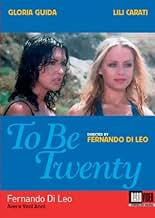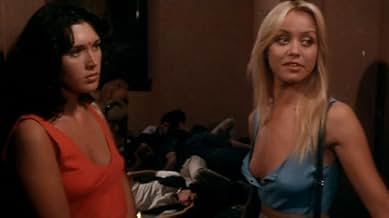PUNTUACIÓN EN IMDb
5,8/10
1,3 mil
TU PUNTUACIÓN
Añade un argumento en tu idiomaTwo young women hitchhike to Rome seeking a free commune and sexual freedom, but instead get entangled with prostitution, police, and a dangerous gang.Two young women hitchhike to Rome seeking a free commune and sexual freedom, but instead get entangled with prostitution, police, and a dangerous gang.Two young women hitchhike to Rome seeking a free commune and sexual freedom, but instead get entangled with prostitution, police, and a dangerous gang.
Carmelo Reale
- Head of rapists
- (as Roberto Reale)
Raul Lovecchio
- Vice-commissioner
- (as Raoul Lo Vecchio)
Salvatore Billa
- Delinquente in Bar
- (sin acreditar)
Angelo Boscariol
- Cliente in trattoria
- (sin acreditar)
Reseñas destacadas
In Fernando Di Leo's 1978 crime drama "Avere vent'anni" (English: "To Be Twenty"), the director takes viewers on a gritty and unflinching exploration of Italy's criminal underworld. Set against the backdrop of Rome's seedy underbelly, the film follows the intertwining stories of two young women, Gloria (Gloria Guida) and Liliana (Lili Carati), as they navigate the treacherous world of prostitution, drugs, and exploitation.
Di Leo's directorial approach is both raw and unapologetic, pulling no punches in its portrayal of the harsh realities faced by the film's protagonists. The gritty cinematography and naturalistic acting style lend an air of authenticity to the proceedings, immersing the audience in the sordid world depicted on screen.
Gloria Guida's performance as the naive and vulnerable Gloria is a standout, capturing the character's descent into a life of desperation and exploitation with heartbreaking realism. Lili Carati, on the other hand, brings a sense of world-weariness to her portrayal of Liliana, a seasoned sex worker who has become hardened by the brutal realities of her profession.
While the film's subject matter is undoubtedly challenging and at times uncomfortable, Di Leo handles it with a deft touch, avoiding sensationalism and instead offering a nuanced and empathetic portrayal of the characters' struggles. The director's unflinching lens exposes the harsh truths of a society that often turns a blind eye to the exploitation of its most vulnerable members.
However, "Avere vent'anni" is not without its flaws. The pacing can feel uneven at times, and some of the narrative threads feel underdeveloped or left dangling. Additionally, the film's relentless bleakness can be a bit overwhelming, leaving little room for moments of levity or respite.
Despite its shortcomings, "Avere vent'anni" remains a powerful and thought-provoking exploration of the darker corners of Italian society. Di Leo's masterful direction, combined with the standout performances of Gloria Guida and Lili Carati, make this a film that lingers in the mind long after the credits roll.
Di Leo's directorial approach is both raw and unapologetic, pulling no punches in its portrayal of the harsh realities faced by the film's protagonists. The gritty cinematography and naturalistic acting style lend an air of authenticity to the proceedings, immersing the audience in the sordid world depicted on screen.
Gloria Guida's performance as the naive and vulnerable Gloria is a standout, capturing the character's descent into a life of desperation and exploitation with heartbreaking realism. Lili Carati, on the other hand, brings a sense of world-weariness to her portrayal of Liliana, a seasoned sex worker who has become hardened by the brutal realities of her profession.
While the film's subject matter is undoubtedly challenging and at times uncomfortable, Di Leo handles it with a deft touch, avoiding sensationalism and instead offering a nuanced and empathetic portrayal of the characters' struggles. The director's unflinching lens exposes the harsh truths of a society that often turns a blind eye to the exploitation of its most vulnerable members.
However, "Avere vent'anni" is not without its flaws. The pacing can feel uneven at times, and some of the narrative threads feel underdeveloped or left dangling. Additionally, the film's relentless bleakness can be a bit overwhelming, leaving little room for moments of levity or respite.
Despite its shortcomings, "Avere vent'anni" remains a powerful and thought-provoking exploration of the darker corners of Italian society. Di Leo's masterful direction, combined with the standout performances of Gloria Guida and Lili Carati, make this a film that lingers in the mind long after the credits roll.
Hippie-exploitation movies aren't my cup of tea, but I honestly thought this was worth an exception based on the names involved. Fernando Di Leo is the writer/director of some of the most brutally violent and uncompromising Poliziotesschi movies, Ray Lovelock starred in many classics in that same sub-genre, and Gloria Guida and Lilli Carati, well... they're both just incredibly hot. Alas, though, even in this film all the annoying trademarks of hippie flicks are inevitable. I'm referring to a senseless plot, passive lead characters, unbelievable dumb weirdos in the supportive cast, copious amounts of pointless dancing footage, and a lot of hinting at sex-sequences that never come.
Beautiful brunette Tina and her even more beautiful blond friend Lia are - to put it in their own words - young, hot, and very angry with the world. They travel to Rome, where they join a sort of commune and get in all sorts of trouble. That's pretty much the only synopsis I can give. There's one very enjoyable sequence, namely when the brunette goes out to sell encyclopedias (yes, really!) and drives a university professor insane by making him believe she gets aroused from hearing the word "culture". Everything else is beyond pathetic, like a roommate dressed up as a meditating Pierrot (Leopoldo Mastelloni), and another lunatic who's dressed like "Where's Waldo?" (Vincenzo Crocciti).
"To Be Twenty" is somewhat notorious for featuring an extremely sick and misogynistic climax that totally doesn't fit the overall tone of the film. True, it's very sick, but it doesn't make the film any better or more interesting whatsoever. I also don't understand what Di Leo meant to say with this climax. Does he feel the girls get what they deserve? Is the moral of the story that women are the weaker sex? Or maybe simply that it's too dangerous for women to be traveling alone? All three options are loathsome, in fact.
Beautiful brunette Tina and her even more beautiful blond friend Lia are - to put it in their own words - young, hot, and very angry with the world. They travel to Rome, where they join a sort of commune and get in all sorts of trouble. That's pretty much the only synopsis I can give. There's one very enjoyable sequence, namely when the brunette goes out to sell encyclopedias (yes, really!) and drives a university professor insane by making him believe she gets aroused from hearing the word "culture". Everything else is beyond pathetic, like a roommate dressed up as a meditating Pierrot (Leopoldo Mastelloni), and another lunatic who's dressed like "Where's Waldo?" (Vincenzo Crocciti).
"To Be Twenty" is somewhat notorious for featuring an extremely sick and misogynistic climax that totally doesn't fit the overall tone of the film. True, it's very sick, but it doesn't make the film any better or more interesting whatsoever. I also don't understand what Di Leo meant to say with this climax. Does he feel the girls get what they deserve? Is the moral of the story that women are the weaker sex? Or maybe simply that it's too dangerous for women to be traveling alone? All three options are loathsome, in fact.
Applying a simplistic, hypocritical morality to this sleazy tale, the filmmaker (Fernando di Leo) gets to have it both ways. His camera captures every lurid detail of multiple sex scenes and takes every opportunity to savor the fine flesh of the tasty leads (Gloria Guida and Lilli Carati). He then condemns the women for being "sluts" and brutally reprimands them for their behavior.
"To Be Twenty" is a highly watchable story about two twenty-year-old free spirits whose youth and naivety bring on their destruction. Ninety per cent of the film graphically depicts the girls in a series of wild and frivolous adventures. Staples of 70's cinema such as drugs, politics, the generation gap, communal living and free sex are thrown into a mix to produce an enjoyable cinematic cocktail that captures the ennui of the period.
The film's surprising last stanza sounds a mean-spirited warning to women who freely advertise their sexuality without any intention of providing it. It is a nihilistic, barbaric, angry scene of human carnage that echoes the darkest aspects of "Last House on the Left", "Straw Dogs" and "I Spit On Your Grave".
A recurring song is used to potent effect over the end credits and the lead characters are brought to vivid life by the talented Guida and Carati.
Recommended.
"To Be Twenty" is a highly watchable story about two twenty-year-old free spirits whose youth and naivety bring on their destruction. Ninety per cent of the film graphically depicts the girls in a series of wild and frivolous adventures. Staples of 70's cinema such as drugs, politics, the generation gap, communal living and free sex are thrown into a mix to produce an enjoyable cinematic cocktail that captures the ennui of the period.
The film's surprising last stanza sounds a mean-spirited warning to women who freely advertise their sexuality without any intention of providing it. It is a nihilistic, barbaric, angry scene of human carnage that echoes the darkest aspects of "Last House on the Left", "Straw Dogs" and "I Spit On Your Grave".
A recurring song is used to potent effect over the end credits and the lead characters are brought to vivid life by the talented Guida and Carati.
Recommended.
Fernando Di Leo is a director that gets a lot of criticism; and most of it is unfair in my opinion as he's directed a lot of the best Italian crime movies of the seventies, as well as some other curious gems. To Be Twenty is something of a departure from his crime films and doesn't really fit into any of the main genre headings that were popular in seventies Italy; although at a stretch it could be described as a cross between a sex comedy and an exploitation flick. The film is slightly misguided and that is its main problem as on the one hand it's light and breezy, and on the other hand it actually tries to make some points...with mixed results. The plot focuses on two young girls who are both young, hot and angry that meet on a beach. They set off to hitch a lift together and so begins an odyssey as the pair try to create an existence for themselves in a world overridden with sex, perverts and drugs. They manage to find a place to stay but not everything goes to plan and before long, the girls find themselves living a nightmare.
The tone of the movie is one of the best things about it as the director excellently captures the hippy-style care free atmosphere through the two young girls. The film stars Gloria Guida and Lilli Carati; both of whom serve the movie well in the looks department, especially when their clothes come off, but don't exactly set the film on fire with great acting. However, luckily this is a film that doesn't need great acting to succeed. The plot flows well and the two girls provide likable characters that make the film fun to watch. It's not exactly plot heavy and the film basically follows the girls on their unplanned journey right up until we come to the tragic ending. The ending is actually rather strange as it doesn't fit the tone of the movie and actually looks more like something straight out of a roughie film. However, it is rather powerful and won't be forgotten in a hurry; and the reason for that is mostly down to the way we are made to like the characters throughout the film. Overall, this film probably won't be for everyone's taste; but if you like this sort of stuff, you could do worse.
The tone of the movie is one of the best things about it as the director excellently captures the hippy-style care free atmosphere through the two young girls. The film stars Gloria Guida and Lilli Carati; both of whom serve the movie well in the looks department, especially when their clothes come off, but don't exactly set the film on fire with great acting. However, luckily this is a film that doesn't need great acting to succeed. The plot flows well and the two girls provide likable characters that make the film fun to watch. It's not exactly plot heavy and the film basically follows the girls on their unplanned journey right up until we come to the tragic ending. The ending is actually rather strange as it doesn't fit the tone of the movie and actually looks more like something straight out of a roughie film. However, it is rather powerful and won't be forgotten in a hurry; and the reason for that is mostly down to the way we are made to like the characters throughout the film. Overall, this film probably won't be for everyone's taste; but if you like this sort of stuff, you could do worse.
Some time in the mid-70s, out-of-luck director Fernando di Leo had a million dollar idea: Why not do a remake of one of the top grossing blockbusters of 1969, with a slightly altered tagline: "Two chicks went looking for Italia and couldn't find it anywhere." And since those chicks would hitchhike across the country to join a hippie community, they didn't even need those pricey motorbikes! The Captain America role went to Euro teen star blonde Gloria Guida, the Billy part to the lesser-known Lilli Carati, a downright stunning brunette literally acting out every single word of her dialogue: I'm young, hot, and p*ssed off. Does anybody here f*ck?" A radically pessimistic statement from the bleak opening beach scene to the unforeseeable (and utterly disgusting) climax, Avere vent'anni bites off more than di Leo could chew: His counterculture swan song about two female libertines who inescapably will go to the dogs never finds a rhythm, a loose, sloppy concoction of scenes that don't blend, a programmatic reading from Valerie Solanas's SCUM manifesto (A pip-squeak with dysfunctional femininity that despises women: That is man.") remaining fairly more than a nod to the feminist zeitgeist in Fernando's T&A exploitation circus. Two stars for the boisterous performance of the lead actresses, reciprocating between vulnerability, sexual aggression, and pure, breathless joie de vivre, especially in the dance scene on the piazza; another one for Ray Lovelock's fine interpretation of a disenchanted druggie, and one and a half for the super catchy theme song. Ah, and as for Signorina Carati: Eat your heart out, Dennis Hopper.
¿Sabías que...?
- CuriosidadesNamed #8 on the list of 10 Best Sexploitation Movies of All Time by website TheCinemaholic in 2017.
- Versiones alternativasThe movie was re-cut shortly after the Italian release. The 81-minute version omits the opening scene on the beach, the sequence featuring explicit lesbian sex between the two main characters, and the violent ending.
- Banda sonoraAvere vent'anni
Written by Silvano Spadaccino (as Spadacino), Fernando Di Leo (as Di Leo)
Sung by Gloria Guida
Selecciones populares
Inicia sesión para calificar y añadir a tu lista para recibir recomendaciones personalizadas
- How long is To Be Twenty?Con tecnología de Alexa
Detalles
- Duración1 hora 34 minutos
- Mezcla de sonido
- Relación de aspecto
- 1.85 : 1
Contribuir a esta página
Sugerir un cambio o añadir el contenido que falta

Principal laguna de datos
By what name was Las veinteañeras (1978) officially released in India in English?
Responde



























